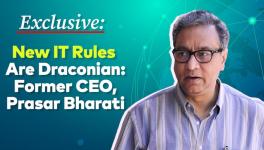Newsclick presents a discussion on the new IT Rules and guidelines presented under the Information Technology Act, 2000. Advocate and member of the Knowledge Commons collective, Rishabh Bailey and editor of Medianama.com, Nikhil Pahwa outline their reservations with the rules and offer remedies.
Rough Transcript
Srinivasan Ramani (Srini): Hello and Welcome to Newsclick. Close to 100 million people in the country today use internet and it's not just a means of communication today, it's a medium that exploded into it becoming a vibrant medium for dissemination of news information and even opinions. Which means the form and nature of internet and therefore IT regulation in the country is of paramount important to us for internet users. So we have with us here today, Rishab Bailey a young Advocate and someone who is associated with the Knowledge Commons collective and Nikhil Pahwa the editor of the popular digital media analysis website, medianama.com and we shall discuss with them or let them discuss the controversies surrounding the guidelines under the IT rules act which have been recently in the news. So let me start with you Nikhil. Now, one of the major concerns the new rules under the Information and Technology Act 2000 is that it has the guidelines about what are called intermediaries that are problematic. Let us start up with what do you really mean by intermediaries.
Nikhil Pahwa (NIkhil): They define intermediaries as any entity whose computer resources has been used to access information on the internet. When you are trying to access information on the internet, there are hundreds and thousands of resources both within the country as well as outside the country that you use and by this broad definition they are all intermediaries. For example, if the ISP that you use that becomes an intermediary. Then ISP connects to bandwidth providers, they all becomes intermediaries. Any cabling network that takes that bandwidth connection to international websites they all become intermediaries. There are three or four landing stations which India connects to the world that's where we connect our internet to the rest of the world and they all are intermediaries according to these rules.
Srini: The IT rules are basically about regulating content on the website.
Nikhil: They are basically about regulating websites. Not just content but commerce, every single type of website uses some internet resource, some computer resource and their existence depends on how these rules are implemented.
Rishab Bailey (Rishab): If I could come in there, the two of the problems that internet raises for a regulator or a state authority is firstly dispersion and secondly anonymity. Dispersion meaning that you have millions of people all over the world and there is no particular location and you need not necessarily pin point geographical or physical location. Secondly, you have the question of anonymity over the internet which you understand very well. But now what these rules therefore seems to do is to create a method irrespective of whether you know where the person is or you know who the person is where you can block the information from being put up. Therefore, and what the government has felt is that every linkage as me as a user, there are two ends of the chain. Me as as user at one end and your content at the other. Between these two as Nikhil just pointed out, there are various number of links. Now, those could be a site from your cybercafe. I am accessing internet from cybercafe, which is getting broadband from somewhere and which has server somewhere else and so on and so forth. So the government has essentially given the power or has under these rules said all these various dots along the chains are intermediaries. So therefore, these regulations applies to everyone who even touches the internet whether it is you, me or intermediary.
Srini: So what do you think about problematic about these regulations that have been framed in this set of rules.
Rishab: Now, I think there are various problems with the intermediary guidelines as they stand. Most importantly, I think firstly, since you were talking about definition of intermediaries it is very important to recognize that all intermediaries do not do the same thing on the internet. So while your definition of intermediaries recognizes for example that intermediaries include both telecom service providers and internet service providers it also includes in that very definition, online auction sites and cybercafes. Now I think, it is fairly clear that these do not provide same function. So therefore, I would argue that responsibility on each to police and also similarly depends on it's functions and therefore, it should be differing. Now that is one issue with what the intermediaries are. I think it needs more rational differentiation based on their function. Secondly, what the intermediary guidelines essentially do. So they prescribe various information and they make it illegal for anyone to put this information online. Now, if this information is put online and if an intermediary receives knowledge of this information. It can be actual knowledge based on it's own trolling of the web or it can be based on a third party report. It must take down this information within 36 hours and without an opportunity being provided to the party whose information is being taken off. Now that is probably the biggest issue with these rules is that essentially the state is forming out a) Judicial function to an intermediary and secondly, the state is also forming out police function.
Srini: Now this function was previously bestowed with the state itself. We had this instances of blogger.com or wordpad.com or blog because of possible violations you know.
Nikhil: There were no specific violations by blogger.com or typepad.com or for that matter baazi.com. There were violations by specific users of those services The core issue here is the implementation of these rules. The definition of intermediaries and some of the provisions in these rules is so broad that it is almost as if government is giving itself the opportunity to use them as and when they want, as and when they please effectively, however they please. In 2006 what happened was that they had issues with some ten twelve specific sites. There was something called, I forget the names but there were specific blogs on blogspot xyv.blogspot.com and they want that blocked. The ways the rules were implemented by the government directive implemented by the ISPs. They entirely blocked the blogspot. I was running the blog at that time in 2006 and I could not access my blog, I could not access my friend's blog and I could not post anything there. Today, there are far greater number of people online. You have got facebook and twitter. Now if the government and the government has no control over twitter as such. So what they are going to do. They are going to contact an intermediary saying please block this particular comment by this individual on twitter. ISP has no ability to block a specific statement. Let's say xyc is essentially breaking the law and that's a lie. If I am saying something which may be disparaging to that particular individual, my comment can be supposedly they believe that an intermediary can block my specific comment. If twitter doesn't comply. What can happen is twitter can be blocked in entirety the way they operate.
Srini: So in essence there are two sets of issues here. One is that, the liabilities are not clearly defined on various intermediaries. And also the kind of content that are supposed to blocked is so vaguely defined and so randomly.
Rishab: Exactly, as you see, the content that is prescribed is fairly wide and includes that is not prescribed under similar laws pertaining to your blocking so on and so forth. Under these rules, any information is grossly harmful,harassing, blasphemous, defamatory, obscene so on and so forth or disparaging. Blasphemous for e.g. is not even a crime in India. What is harassing. Can an intermediary decide whether I am harassing someone else based on one complaint based on one email which in fact the rule say on the basis of the email it is supposed to act.
Nikhil: That's exactly where the problem lies. What an intermediary will say that I will not take any liability on myself for e.g. someone who is running a website, I am an intermediary. My company is an intermediary. If someone files a complaint, my first reaction is I don't want to take on any liability,
Rishab: Iin particular if it's copy right material.
Nikhil: No, even if it is not copyright. Something perhaps that is perhaps blasphemous something that might be disparaging. I want to say if someone is going to file complaint, if I don't act upon it I will be held liable for not acting upon it so to safeguard my existence, my first step will be let's block. So you are making not only in this case the government looking to police content on the web they are making honest intermediaries, they are forcing them to police. What's that choice.
Rishab: Just to connect it to what we were talking earlier in terms of state regulation in terms of blocking. Crucially, intermediaries will not be forced to give out information. We will never know why something was blocked, when it was blocked and so on. The government however is susceptible to right to information. So if you have a government authority which is overseeing blocking as under 69 A of the information technology act, you can for e.g. get out the sites names that have been and say why these have been blocked.
Nikhil: Even that is being tricky because what we found is there are several sites that have not been accessible at various points of time at the same time, when we try to get a list of sites from the DoT, we got only eleven sites and some of the sites that for example, mobango.com which is an applications in market place was not in that list. So why it is being, imagine I am mobango. India is my main market, I am an Indian Company and my site is blocked. I don't know why it is been blocked. I don't know how to get that block removed. So basically, there is an element of arbitrariness in the air.
Nikhil: More importantly, there is also opacity. If there is transparency, there is a public listing of sites that have been blocked. There is a specific instance of url being blocked and also why it is being blocked and who has taken the decision to block it and how it is that the block can be removed, then I would say that there is fair play involved. Right now, there is no fair play. If my site gets blocked tomorrow, my business will shut down and I would not know what to do about it.
Srini: Rishab, I would get to the larger question of legality. You just know told us that content can be defined as harassing, disparaging, blasphemous and so on and so forth, doesn't that violate constitutional rights?
Rishab: Absolutely, 19(1)does recognize right to freedom and expression though it is subject to 19(2) which lists out various conditions under which it is restricted. So undoubtedly, yes you could say that these words in and off themselves might fell foul of 19(1A) but of course, the greater problem is how well it will be used by intermediaries and as Nikhil points out essentialy what is going to happen is intermediaries are going to block chunks of sites or entire blocks which will clearly will lead to lack of information,
Nikhil: There is one other issue as well. So far any blocks have been instituted on the basis of either on a government directive or a court order. Under these rules, any individual can file a written complaint. This just opens up can of worms. Any one can start filing complaints on any basis because you have such wide terminology used here. You can say any video put on you tube is harassing to me and it is intermediary's responsibility to remove it. Has to remove it.
Srini: It reminds of what google had pointed out sometime back. They came up with listings of instances where chief ministers have asked for certain videos to be removed from youtube and so on and so forth.
Nikhil: They have refused by the way. There were many instances where they refused. But, not every intermediary is gong to be as correct or as aware of their responsibility.
Rishab: Google can take up that responsibility.
Nikhil: I can't. As an intermediary, I can't do that.
Rishab: On this issue of blocking again, I think it is important issue that Nikhil did raise because when 69A was introduced in IT Act it was specifically in the wake of the fact that you had PUCL decision and the rules therefore laid down in the context oftelephone tapping . So now the rules required for blocking, they are fairly specific in nature mostly look at national security issues, public order issues, commission of cognizable offenses so on and so forth. However, what we have here is a far larger gamut of crimes firstly and secondly the method with which they are dealt. For e.g. under 69 A, you have a clearly laid out process whether Home Secretary, so on and so forth orders or else based on judicial order. There is a clear process. In India's case, it is all executive action but again there is a clear laid out process. Here, there is nothing. So the absence of any guidelines as to how any determination is to be made. Absence of any sort of redressal mechanism, it's also I mean it's funny to note that the guidelines itself say that a grievance redressal mechanism must be set up it's only to take complaint. Not to deal with complaint. Not to deal with people whose information has been censored.
Srini: You must have studied regulations elsewhere, other nations. Could you tell us what's the situation elsewhere?
Rishab: Sure. Now see, in the US and England which is where the laws initially started coming up because that's what internet do. Till 1996, there was legislative vacuum in the sense cases based generally on common law principles. In America, the first amendment rights there are very very strong about their free speech rights and therefore when they passed their telecommunications act in 1996, they gave specific safer haven to intermediaries irrespective of anything as long as they showed that they are not actively conniving and so forth. Under section 230 of the communications act in the US, they have absolute liability. However, later on due to industry pressure and so on, particularly in the case of copy rights, it was felt that a take down and notice systems similar to what we have here under these rules would be better. Right now, what you have in the US under the digital millennium act is the take down and copy right notice.
Srini: But, it is as restrictive as it is here?
Rishab: It is. It is as restrictive in fact, you have various systems.
Nikhil: But the copy right is not covered in this particular act.
Rishab: It also covers copyrights and it also covers various other things. That is part of the issue also. I would disagree with the American rules as well because they don't give a case for hearing for e.g. and you have practical instance where it has been misused for e.g. in the last elections as well where Barack Obama and John Mc Cain is facing off. You have political parties taking other people's videos from you tube claiming that they were copy right violations purely as a political tactic but using these laws. Similarly, something worst could happen in India given that these laws are far broader and actually this is an important point. This is something which I wanted to say earlier. I think there has to be a classification of the various offenses also in the act. I don't think you can deal with terrorism on the same scale as harassing someone. So clearly, there has to be a differentiation there. As far as UK is concerned, the UK also follows the similar take down and notice procedures. However, in the case of blocking and so on they have far more stringent procedures, with far more transparent, they have tribunals set up to deal with issues of complaints.
Srini: Basically all those address and complaints that Nikhil had in mind.
Rishab: Secondly, they only deal with defamation. The England had no laws at the moment any way which deals with copy right violation. This is a concern.
Srini: That takes us to the the last question. Do you think this set of rules are redeemable. What remedies do you think should be there?
Rishab: Definitely. I think it is very easy to change rules because firstly, the rules are there on the table of Parliament right now. So there can be a mandate as they stand. They can also be looked up by committees once they have been passed and also and also amending rules, making changes to rules to incorporate what I think our rational changes for example differentiating between crimes and differentiating between crimes, differentiating between intermediaries are not necessarily act itself the act itself necessarily contemplate because the act itself recognizes intermediaries have different roles. It recognizes the fact that intermediary could take up the defense that it is merely providing transient services ore merely it is acting as a storage vehicles for instance. So why can't these differences be made rational, fair and put into the rules. Intermediaries might include x to y, well and good. You can treat them differently if you perform different functions.
Srini: So Rishab, you are arguing for rational, fair and robust set of regulations completely. Do you agree completely?
Nikhi: Yes, I think this should rational, fair and robust. I would like to specifically mention what I consider fair. It is anything that is not really a crime just because something is disparaging or that can impact friendly relations between nations doesn't mean that people should have opportunity to voice their opinion. So there is a lot of contents that may be deserves to be taken down. But I think there is a greater good involved in people being allowed to voice what they want to say. I would say that if it is not crime, it should not be covered by these rules. The other thing is that there needs to be a fair and inexpensive recourse available to people whose content gets blocked. There needs to be a transparency above all. My core belief is that if there is transparency, then people will feel they can be held accountable. Who has taken the decision to get something blocked? Who has filed complaint for a block. What are the reasons for instituting a particular block? How can that block be removed? That information needs to be there more and more importantly, today when a site is blocked more often you just get a 404 error saying that you can't access it. I will give you the example of Kuwait, when Kuwait blocks a site and you visit it, then there is a landing page which informs you that a particular department has got it blocked and in case you have certain issues with this decision, it gives an email address for people to contact. India has not even gone that part. We just get that it's not working and quite often we think that it is the problem with ISP. So, there needs to be transparency and there needs to be fairness.
Srini: I think we can end on that note. Thak you Nikhil and Rishab. I hope our law makers listen to you and make that rational, fair and robust changes you want to be incorporated in this IT Rules Act. Thank you.























